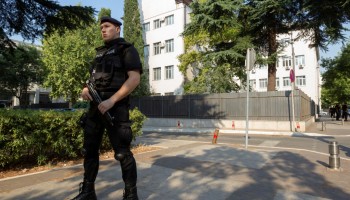So was he killed by a horse? Or did somebody shoot him?
More than two years later, the answer is still unclear. Crucial evidence has gone missing, and a powerful police official denies that he interfered with the investigation, even as he denies his son was involved in Arevadze’s death.
The evidence pointing to bullets includes:
Two small puncture wounds on the left buttock 8-9 centimeters deep and 1 centimeter apart (investigators suggested he fell onto sharp rocks, but there were no sharp rocks near the spot where he died).
The nails on the shoes of the horse that investigators claim kicked the deceased were 2 centimeters apart. Near those two punctures, there was no sign of the bruising or internal bleeding that a potentially fatal kick from a horse would cause.
His pelvic bone was shattered; according to an independent forensic expert who has examined the evidence, the nature of the injury suggests that it did not happen from a collision or a fall.
There was no horsehair on the body and no signs of injury on the horse.
One set of X-rays showed two white spots that a doctor who specializes in reading X-rays said were similar to those made by bullets lodged in a body.
A doctor who read the X-rays twice suggested to the medical examiner that he look at one white spot near a lower back vertebrae.
The medical examiner came out of the autopsy exam at one point and told relatives that Arevadze had been shot. But in his final autopsy report, there is no mention of any bullets, or of the 11 X-rays that were taken of the body.
This trail of evidence appears to have been mishandled, downplayed or ignored by:
The Kharagauli local police department
Imereti regional police department
Medical examiner Grigol Grigolashvili
Kutaisi city prosecutor Davit Simonia
Kutaisi City Court
Kutaisi Appeals Court
Georgia Supreme Court
Why?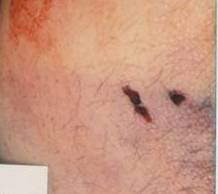 Two puncture wounds about 1 cm apart
Two puncture wounds about 1 cm apart
were found on the body.
Davit Mchedlidze, the hunter who was riding the horse in the park at the time, is sitting in Ortachala Prison No. 12 serving the last few months of a three-year sentence for “accidentally causing death,” which was reduced from an earlier murder conviction. He has consistently denied having anything to do with Arevadze’s death.
But a series of sometimes heated meetings between Arevadze’s family and a powerful local official, Imereti regional police department deputy chief Mamuka Chkoidze, centered on accusations that Chkoidze’s son Giorgi was involved in Arevadze’s death and that Mamuka Chkoidze used his influence to cover up that involvement.
In a phone conversation with an OCCRP reporter, Mamuka Chkoidze acknowledged that there were accusations against his son, who was 16 at the time of the crime, but strongly denied his son was involved. Accusations from the victim’s family revolve around a local government official’s birthday party, and whether Arevadze came upon someone trying to kill a deer to provide meat for that party. The fines for hunting in the park are very high.
“If they think my son killed Arevadze with my gun, they could have examined my gun, but they didn’t do it,” Mamuka Chkoidze said.
That’s not a strong argument in an investigation, conducted in part by Mamuka Chkoidze’s own police department, which has failed to examine many key pieces of evidence.
Death in the Dark
According to court documents, Arevadze died after being struck by a horse ridden by Davit Mchedlidze. The court document says Mchedlidze, a 28-year-old former policeman himself, then hid the body near a place called Stepuri Grove with the help of his 33-year-old cousin, Zaza Mchedlidze.
In February of 2013, Kutaisi City Court sentenced Davit Mchedlidze to 20 years for murder with a blunt object. (A nationwide amnesty program reduced that sentence to 15 years). The court sentenced Zaza Mchedlidze to 27 months for covering up the crime.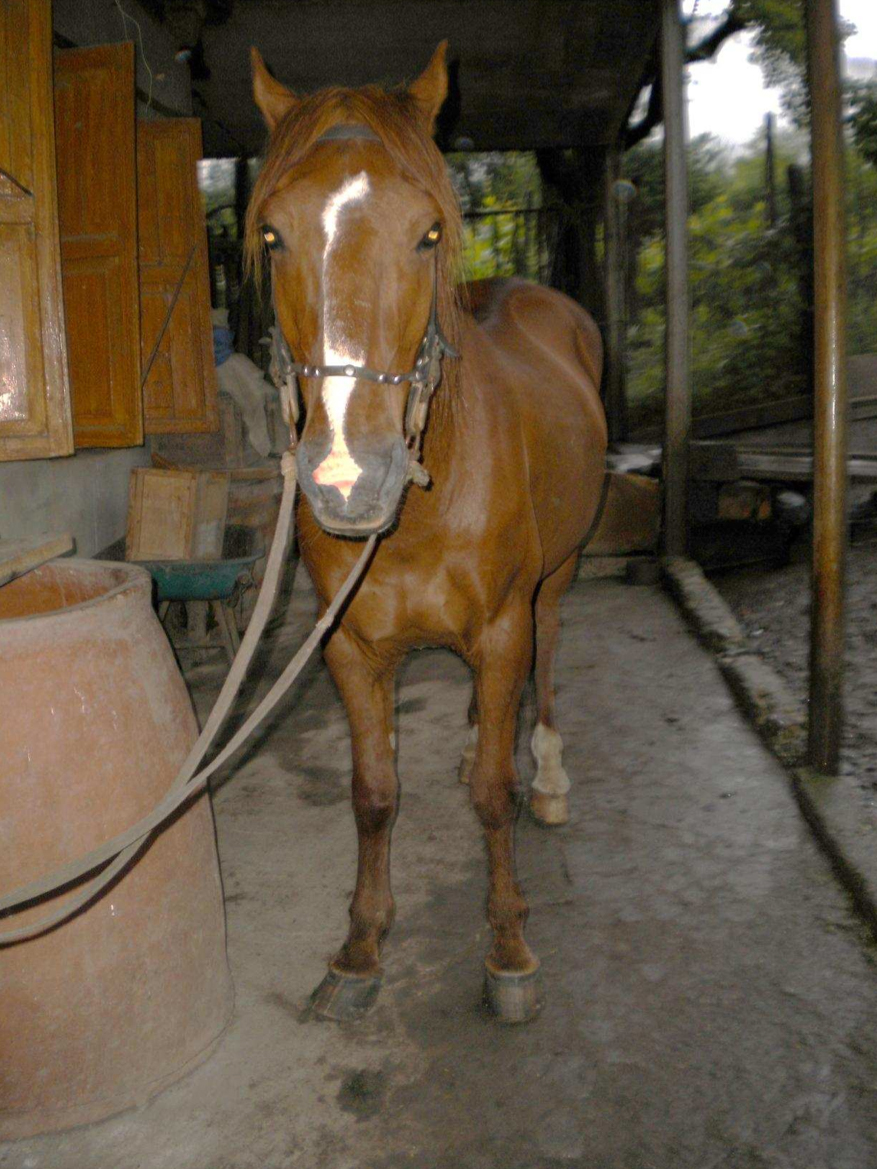 There were no signs of a collision or any injuries on the horse that investigators claim caused the death.
There were no signs of a collision or any injuries on the horse that investigators claim caused the death.
The Kutaisi Appeals Court changed the method of murder to “killed by horse” but did not change the sentence.
But in December 2013, the Georgia Supreme Court reduced Davit Mchedlidze’s sentence to three years, ruling that he killed Arevadze by accident, and released his cousin Zaza. In its two-page ruling, the Supreme Court gave no reason for changing the conviction from murder to causing an accidental death.
Davit Mchedlidze is scheduled for release in May of 2015.
The two cousins were among a group of six men working as shepherds and at the same time hunting illegally in the park that night. The six hunters first entered the park on May 14, three days before Arevadze’s death. They say that they failed to kill any animals. An investigation by Ministry of Interior forensic experts did not find any meat or traces of animal blood on the hunters, their guns, or their belongings.
The hunters say they knew Arevadze because they all lived in neighboring villages in the Kharagauli region. Nobody admitted to being an eyewitness to his death, and there are many discrepancies between the official investigation and the stories the hunters and others tell today.
Davit Mchedlidze, interviewed in prison, says he heard two gunshots when he rode into a grove about 100 meters ahead of the other hunters, and was met by two shepherds he knew, Gogi and Ramaz Maghradze, who tried to grab the reins of his horse and stop him. Mchedlidze says he then saw five or six men beating somebody.
“Gogi and Ramaz recognized me. They know I am a former policeman,” Mchedlidze said. “As I rode back toward the other hunters, Gogi and Ramaz shot twice over my head. We all decided to find a place to hide. Nobody wanted to go back to the grove and see what happened. After several minutes we saw that other group of men leave the area. So we left our hiding place and started home.”
Gogi Maghradze denied in court that he was even in the park that night. His family says he was at home, and his cell phone records indicate his phone, at least, was not near the signal tower in that section of the park.
Arevadze had worked in the 61,235-hectare national park located in central Georgia since it opened in 1995. He was a chief ranger, responsible along with five other rangers for protecting 470 hectares. Arevadze’s job included night patrols to catch hunters. The fine for taking a rifle into the park is between US$ 50 and US$ 100. The fine for killing a deer is a whopping US$ 9,000, nearly three times Georgia’s per capita income in 2012.
Arevadze and fellow ranger Tamaz Tsiskadze went on patrol in the park on May 16. When Arevadze’s body was found three days later on May 19 by search party member Gela Fanculaia, it was in a narrow space between two huge rocks, and he was seated with his back against a tree and his left arm resting on a tree stump.
At the crime scene, Kharagauli local police department investigator Irakli Arevadze (no relation) found a wound on the back of the head that the autopsy report stated was caused by a blunt object. The report states that three ribs were broken and his left wrist was fractured.
The two punctures in his left buttock were also evident to witnesses at the scene. Investigator Irakli Arevadze included them in his report, but did not suggest what caused the wounds. The autopsy report stated the wounds were made by an “unknown sharp object.” Timeline
Timeline
The Investigation
Grigolashvili, the medical examiner, performed the autopsy at a clinic in the regional capital of Kutaisi, located about 90 km from the scene of the crime. Zviad Arevadze and Zaza Zirakadze, two relatives of the victim, waited with his friend Gela Talakhadze outside the clinic during the exam.
Zviad Arevadze says he went inside and watched the preparation for the exam for 10 minutes before Grigolashvili ordered him out of the room because he did not have the document, required under Georgian law, that allows a relative to be in the room during the autopsy.
"We already knew that he was killed by a bullet,” Zviad Arevadze said. “We were standing outside the clinic, talking about how he was also beaten. After about a half-hour, Grigolashvili came out and told us there were no traces of a beating on Arevadze’s body. When I protested, he said: ‘I am an expert and only I can decide the cause of death. This man's death was caused by two bullets to his pelvic bone. When he fell down, he broke his ribs and wrist.’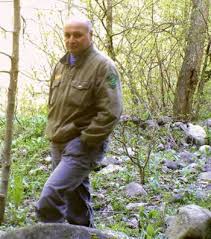 Merab Arevadze had worked as a ranger for 17 years before being found dead in the park.
Merab Arevadze had worked as a ranger for 17 years before being found dead in the park.
“We asked him about the head wound, and he said that could also happen in a fall. He wanted to exclude evidence that Merab was beaten. But he confirmed there were bullets, and the angle showed that he was shot from below and behind. He said the shots were fired from 2-3 meters away, and that Arevadze was bent over. He said he took 2-3 liters of blood from the stomach, and that one of the bullets was stopped by the spine and the second near the ribs.
“Then he went back into the exam room. The window was open, and a couple hours later I heard him talking on the phone to someone he called Sergo. Grigolashvili said on the phone that he had found one bullet and was looking for the second.”
Grigolashvili confirmed in Kutaisi City Court that he had a phone conversation with Sergo Adeishvili, chief detective for the Imereti regional police department, but he denied saying that he had found a bullet. The detective gave Grigolashvili some background information about the case, and the doctor answered some questions the detective had about the autopsy, including whether there were any bullet wounds.
When the autopsy was over, Zviad Arevadze asked for the official cause of death. Grigolashvili said he had already told them more than they needed to know.
In his court testimony, Grigolashvili said he did not immediately write an autopsy report because he was waiting for his boss, West Georgian forensics bureau chief Revaz Lomtadze, to come and give him some advice. Soon after Lomtadze arrived, Grigolashvili finished the autopsy. Lomtadze did not sign the autopsy report.
One of the more puzzling aspects of the case involves X-rays taken of the body that night, what the X-rays showed, and what ultimately happened to them.
Grigolashvili ordered technician Liana Chogovadze to take X-rays. Chogovadze took several preliminary X-rays. At this point, Tatiana Pitkina, a doctor who specializes in reading X-rays, arrived.
Pitkina says she found three X-rays on her desk, and that at least one of them had two white spots that she thought looked like bullets. Grigolashvili testified that Pitkina told him twice to look carefully at the white spots.
The medical examiner than asked that the body be taken back to the exam room. He checked the tissue area where the white spots were located, and he removed one vertebra, examined it, and returned it to the body. He did not mention the vertebra in his autopsy report.
Grigolashvili then asked that the body be taken to the X-ray room a second time. A second set of X-rays was taken. According to the medical examiner, there were no white spots on these X-rays. Grigolashvili said in court he believed the blank X-ray sheets were defective. By this time Pitkina, the expert in reading X-rays, had left the clinic and gone home.
Pitkina says that defective blank X-ray sheets are uncommon. “Every time before we do an X-ray, we check the sheets, and we do not use them if they are damaged,” she said.
It was far from a routine night of work for Pitkina. She said her office was full of unfamiliar people. She said she never seen Grigolashvili before.
She was not asked to write up her findings, which is the normal procedure. The next morning, when she wanted to check the 11 X-rays the technician took, she learned police had taken them away.
“Maybe there was a technical defect (in the X-ray film),” she says. “But if I had written a report that night, it would have stated that those white spots were the shadows of bullets.”
Before being approached by an OCCRP reporter, Pitkina said she had never been questioned by investigators or any court.
Grigolashvili didn’t include any X-ray information in his final autopsy report, but he did testify about them in court.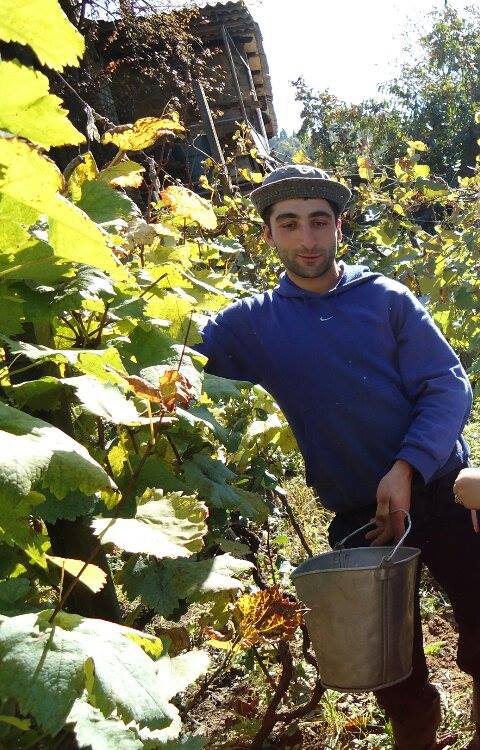 Davit Mchedlidze is serving the last few months of a three-year sentence for “accidentally causing death,” which was reduced from an earlier murder conviction.
Davit Mchedlidze is serving the last few months of a three-year sentence for “accidentally causing death,” which was reduced from an earlier murder conviction.
Imereti regional police investigator Davit Khamshuridze told the court he was in the X-ray room when the body was returned a second time. Khamshuridze said he had not been working on the case, but was asked to go to the clinic by chief detective Adeishvili. Khamshuridze said the medical examiner told him he didn’t need the X-rays for his report: “I thought the doctor reading the X-rays didn’t need them, either. So I took them to my office.”
These X-ray results never were treated as official evidence in the case because they were never listed in any official report. Nobody has asked Khamshuridze to produce the X-rays. Nobody checked the X-ray machine for possible defects.
In June of 2014, Arevadze’s family asked Aleksandre Gejadze, head of the independent Vector Forensic Bureau in Tbilisi, to conduct an investigation on the X-rays. When Gejadze requested the X-rays from the prosecutor’s office, he was given only 9 of the 11. There were no white spots in the X-rays he received.
The autopsy report states only that the two wounds were made by an unknown object, that the pelvis bone was shattered, the main artery burst, and the victim bled to death. Gejadze says if there was a horse collision so violent that the pelvis bone was shattered, “there definitely should be horse hair on the body.”
Arevadze also suffered injuries to the ribs, head and hand while still alive. In court, Grigolashvili said it was “possible” that the victim was beaten before he died.
Grigolashvili now refuses to comment, saying his superiors have ordered him not to talk. Sopho Dvalishvili, spokeswoman for the Georgian National Forensics Bureau, said nobody can comment on the case and that information would not be given to journalists because the Bureau says journalists are not considered interested parties in the case.
Back to the scene of the crime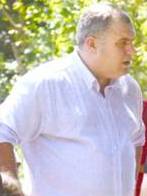 Powerful local police official Mamuka Chkoidze denies accusations that he influenced the investigation of the case.
Powerful local police official Mamuka Chkoidze denies accusations that he influenced the investigation of the case.
Tsiskadze, the ranger who entered the park with the victim, returned to the scene of the crime four days later with the detective Adeishvili and Western Georgia regional prosecutor Aleko Imedashvili. They brought with them Zaza Chkoidze (a distant relative of Mamuka Chkoidze), one of the shepherds who was in the hunting party, and Joni Arevadze, a friend of the victim.
Even though the final autopsy report made no mention of bullets, Adeishvili fired a gun twice to see if Zaza Chkoidze could hear it at a distance of first 70 meters and then 100 meters. Chkoidze said he could hear these gunshots, but said he hadn’t heard anything the night of the crime. There is no police report about this trip, although Adeishvili did tell the court about it.
Tsiskadze and Joni Arevadze both confirm that Adeishvili shot a video interview with Zaza Chkoidze that day. Chkoidze said he told his version of what he saw. But the video was never produced as evidence in the case.
During the initial phase of the investigation, the Ministry of Interior forensic investigators checked the weapons of all six men who were in the hunting party. They also checked a pistol belonging to the convicted man Davit Mchedlidze, even though he said the pistol was back at his home the night of the death. But their report for the court included only photos of the weapons and a listing of their make and model.
While Davit Mchedlidze sits in prison, the victim’s family has focused its wrath on Mamuka Chkoidze, saying he tried to bribe them, threatened them several times, and was deeply involved in hiding evidence.
Mamuka Chkoidze confirms that he met the victim’s family three times, but says he did not try to bribe them. “I also met Arevadze’s brother and asked him whether my son looked like a killer or not,” Chkoidze said.
Mamuka Chkoidze denies any attempt to hide evidence or influence the investigation. He claims a political opponent who defeated him in a 2012 race for a Parliament seat spread information his son was involved in the death. Giorgi Chkoidze has never been questioned, never commented on the crime, and has moved away from the region.
“If I was interested in influencing this case, I could have had (Davit Mchedlidze) released a long time ago,” Mamuka Chkoidze said. “I do not want to talk about this case, because they are blaming me and it’s not right. I care about my son because he is young, and it is not his fault that I was in politics.”
After pleas by the families of both the deceased and the convicted man, regional prosecutors ordered the Kutaisi City police department to conduct a new investigation, which is ongoing. One option, if the family agrees, would be to exhume Merab Arevadze, in hopes there is some clue still in his body to exactly what killed him.






